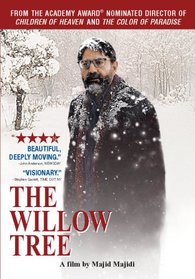| Actors: Parviz Parastoei, Mahmoud Behraznia, Soghra Abisi, Roya Teymourian, Melika Eslafi Director: Majid Majidi Genres: Indie & Art House, Drama Sub-Genres: Indie & Art House, Drama Studio: New Yorker Video Format: DVD - Color,Letterboxed DVD Release Date: 05/20/2008 Original Release Date: 01/01/2005 Theatrical Release Date: 01/01/2005 Release Year: 2008 Run Time: 1hr 36min Screens: Color,Letterboxed Number of Discs: 1 SwapaDVD Credits: 1 Total Copies: 0 Members Wishing: 2 MPAA Rating: Unrated Languages: Persian Subtitles: English |
Search - The Willow Tree on DVD
  | The Willow Tree Actors: Parviz Parastoei, Mahmoud Behraznia, Soghra Abisi, Roya Teymourian, Melika Eslafi Director: Majid Majidi Genres: Indie & Art House, Drama UR 2008 1hr 36min Blind since childhood, Youssef has a devoted wife, loving daughter, and successful university career, but his affliction fills him with secret torment. As if in answer to his prayers, a clinic restores his sight - a miracl... more » |
Larger Image |
Movie DetailsSimilar Movies
|
Movie ReviewsTarkovsky meets Neo-realism, with okay results The Critic | USA | 06/23/2008 (3 out of 5 stars) "Made several years after The Color of Paradise, Majid Majidi once again places a blind person in the lead role. This time, the main character is a 45-year old university professor named Yusef. Yusef leads a comfortable life with a good job and a loving family, which includes a devoted wife, playful daughter, and caring mother. A cornea transplant allows him to regain the sight that he lost in an accident as a young boy. Rather than exulting in his new sense, Yusef instead becomes confused and depressed. He shuns work, tires of his plain-looking wife, and fancies a young student. As with Majidi's other movies, the ending lacks a neat resolution. The overall style of this film is in line with Children of Heaven and The Color of Paradise. The settings are realistic, the cinematography is extraordinary, and Iran is a lush, mountainous land of mostly gentle people. However, this film is more subtle and slow paced. It lacks the emotion and vivid characterizations of The Color of Paradise and the energy of Children of Heaven. The plot is also more abstract. Despite, its flaws, most fans of Majidi will be satisfied. " What does it really mean to be blind? Michael I. Chaplan | Kohoku-ku, Yokohama Japan | 07/23/2008 (5 out of 5 stars) "A blind Iranian college professor gets his sight restored. How does this affect him, and how does it especially affect those who have cared for him up to this point in his life? There are some surprises here that will require a re-viewing to really understand. This is the most subtle of the films I have seen by Majidi... and I have seen as many as I could find!" Second chances . . . Ronald Scheer | Los Angeles | 05/06/2010 (5 out of 5 stars) "This is a lovely, meditative film on the subject of - well, it's not easy to say. On the surface, a middle-aged university professor, blind since boyhood, unexpectedly recovers his sight after a cornea transplant in Paris. Returning to Tehran, he discovers that the little "paradise" he has inhabited looks more like a dead end, and he yearns for the life of a free man that was taken from him by his blindness. He complains to his wife that he no longer wishes to be mothered. He's ready to grow up, but sadly he is now a 45-year-old, and there is no living his years of blindness over as a sighted and independent man.
A viewer can wonder whether the reference is to the Islamic Republic itself, which has deprived many Iranians of living independently without the rigid control of the state. While the film tantalizingly alludes to what might have been a romance between teacher and student, there are only longing looks from afar and the appearance of a hand in the frame to suggest her presence, but nothing more of her than that. When his wedding ring has fallen to the floor of the classroom, she suggestively pushes it toward his searching fingers where he can find it. Meanwhile, she and the rest of the women in the film, including the man's wife, never remove their head scarves. There is no escaping the puritanical separation of genders, even in the man's home. Is this what the film is about? Only partly, if at all. Blindness seems meant as a metaphor for all frustrated desires: the inability to indulge the eye (this is a movie after all), the heart, the other gifts which men and women have to engage fully with the world and each other. To see, is too see the limitations that this kind of blindness has created and to feel deprived and angry rather than grateful. The prayer that the man inscribes in Braille is to be given a second chance. The granting of that prayer it turns out is not enough." |



